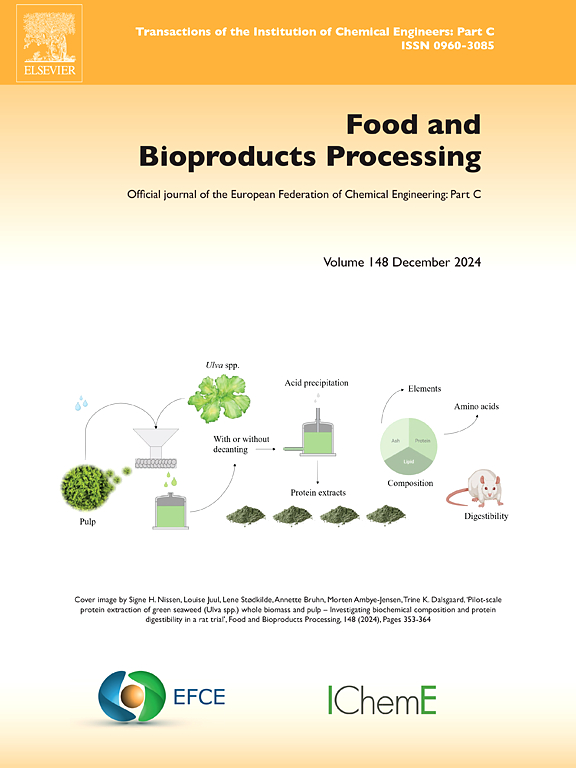Effect of density and size of inert particles in an alternative rotary dryer applied to paste-like material
IF 3.4
2区 农林科学
Q2 BIOTECHNOLOGY & APPLIED MICROBIOLOGY
引用次数: 0
Abstract
The drying of pastes to produce powdered materials has become increasingly important in the chemical, pharmaceutical, and food industries. An attractive alternative to the conventional spray-drying technique is the use of inert particles for paste drying. In this work, a rotary dryer with an inert bed, a device developed at Federal University of Uberlândia, was used to dry a fruit pulp into a powdered material. However, the efficient use of this device still presents significant challenges to be overcome. Besides appropriate operating conditions, the correct choice of inert material is crucial. This study investigated the effect of inert particles of different densities and sizes on the performance of this alternative system. Simulations using the Discrete Element Method (DEM) were conducted to investigate the behavior of inert flow inside the drum, and experimental tests were performed to quantify the effect of operating variables on process yield, aiming for an optimization study. Spheres of stainless steel (ρs = 8000 kg/m³), ceramic (ρs = 2300 kg/m³), and polypropylene (ρs = 900 kg/m³) were used as inert materials, with west indian cherry pulp as the paste material. The DEM simulation results showed that when inert stainless steel particles were used, the collision forces were 424.77 % higher than those obtained with inert ceramic particles and 1209.27 % higher than those from polypropylene particles. The optimization study revealed that the highest process yield was achieved using a maltodextrin concentration of 21.7 %, a fraction of smaller inert particles of 75 %, and a temperature of 95.7°C. The nonconventional rotary dryer successfully produced powdered fruit, highlighting its potential as an efficient alternative to traditional drying techniques for paste-like substances. This research underscores the dryer’s innovative design offering promising applications in food processing and other industries requiring efficient solutions.
惰性颗粒的密度和大小的影响,在一个替代旋转干燥器应用于糊状材料
在化学、制药和食品工业中,糊状物料的干燥生产已变得越来越重要。一个有吸引力的替代传统喷雾干燥技术是使用惰性颗粒膏体干燥。在这项工作中,印度联邦大学开发了一种带有惰性床的旋转干燥机,用于将果肉干燥成粉末状材料。然而,该装置的有效使用仍然面临着需要克服的重大挑战。除了适当的操作条件外,正确选择惰性材料也至关重要。本研究考察了不同密度和尺寸的惰性粒子对该替代体系性能的影响。采用离散元法(DEM)模拟研究了鼓内惰性流动的行为,并进行了实验测试,量化了操作变量对工艺收率的影响,旨在进行优化研究。以不锈钢球(ρs = 8000 kg/m³)、陶瓷球(ρs = 2300 kg/m³)、聚丙烯球(ρs = 900 kg/m³)为惰性材料,西印度樱桃浆为膏体材料。仿真结果表明,采用惰性不锈钢颗粒时,碰撞力比采用惰性陶瓷颗粒时高424.77 %,比采用惰性聚丙烯颗粒时高1209.27 %。优化研究表明,当麦芽糖糊精浓度为21.7 %,惰性颗粒比例为75 %,温度为95.7℃时,工艺收率最高。这种非传统的旋转干燥机成功地生产出了粉末状的水果,突显了它作为一种有效替代传统干燥技术的潜力。这项研究强调了烘干机的创新设计,为食品加工和其他需要高效解决方案的行业提供了有前途的应用。
本文章由计算机程序翻译,如有差异,请以英文原文为准。
求助全文
约1分钟内获得全文
求助全文
来源期刊

Food and Bioproducts Processing
工程技术-工程:化工
CiteScore
9.70
自引率
4.30%
发文量
115
审稿时长
24 days
期刊介绍:
Official Journal of the European Federation of Chemical Engineering:
Part C
FBP aims to be the principal international journal for publication of high quality, original papers in the branches of engineering and science dedicated to the safe processing of biological products. It is the only journal to exploit the synergy between biotechnology, bioprocessing and food engineering.
Papers showing how research results can be used in engineering design, and accounts of experimental or theoretical research work bringing new perspectives to established principles, highlighting unsolved problems or indicating directions for future research, are particularly welcome. Contributions that deal with new developments in equipment or processes and that can be given quantitative expression are encouraged. The journal is especially interested in papers that extend the boundaries of food and bioproducts processing.
The journal has a strong emphasis on the interface between engineering and food or bioproducts. Papers that are not likely to be published are those:
• Primarily concerned with food formulation
• That use experimental design techniques to obtain response surfaces but gain little insight from them
• That are empirical and ignore established mechanistic models, e.g., empirical drying curves
• That are primarily concerned about sensory evaluation and colour
• Concern the extraction, encapsulation and/or antioxidant activity of a specific biological material without providing insight that could be applied to a similar but different material,
• Containing only chemical analyses of biological materials.
 求助内容:
求助内容: 应助结果提醒方式:
应助结果提醒方式:


